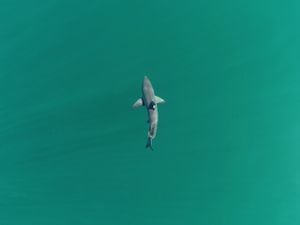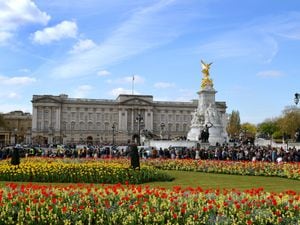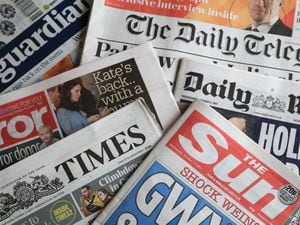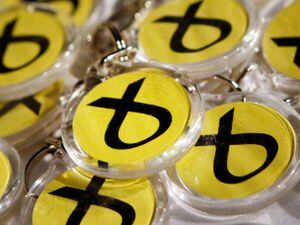Taoiseach views devastation inflicted by Russian forces on visit to Kyiv
Micheal Martin toured the war-torn suburbs of Borodyanka, Bucha and Irpin.
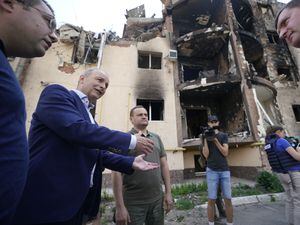
Ireland’s premier witnessed the devastation inflicted by invading Russian forces as he visited areas of Kyiv that have borne the brunt of the offensive on the city.
Taoiseach Micheal Martin began a trip to the Ukrainian capital by viewing the conflict-scarred suburbs of Borodyanka, Bucha and Irpin.
The tour included a sombre visit to the site of a mass grave in the grounds of a church in Bucha.
Mr Martin is using the visit to Kyiv to reiterate Irish solidarity with the Ukrainian authorities in the face of the Russian invasion.

His day-long itinerary in the war-torn city began with a trip to Borodyanka – a town on the outskirts of Kyiv that has suffered widespread damage under Russian shelling.
On the 30-minute drive from the railway station, the Taoiseach passed Hostomel airport, where his convoy stopped to observe a demolished bridge.
The delegation also drove past bombed-out warehouses, shopping centres and petrol stations.
The scale of Ukrainian efforts to defend their capital was evident, with numerous bunkers and fortifications visible on the journey.
In Borodyanka, Mr Martin met the town’s mayor and viewed apartment blocks gutted by fire during the Russian bombardment.

From there, Mr Martin visited the site of a mass grave in Bucha.
The grave was discovered in the grounds of the church of St Andrew.
A local cleric showed Mr Martin the site and an associated exhibition of graphic photographs of exhumed bodies and pictures of civilians left dead on the streets of the suburb when Russian forces retreated.
The Irish delegation then travelled to nearby Irpin where the Taoiseach was shown badly-damaged apartment blocks that had been hit by Russian shells.
Afterwards, Mr Martin said: “It is difficult to comprehend the devastation and inhumanity of Russia’s attacks on Irpin, Borodyanka and Bucha.
“Clear how important it is for women and children to get to Ireland to escape trauma and brutality. We stand with Ukraine.”
In meetings later on Wednesday, Mr Martin will discuss how Ireland and the EU can support Ukraine.
Mr Martin will restate Ireland’s full backing for continuing sanctions against Russian President Vladimir Putin’s regime, for Ukraine’s path to full EU membership, as well as Ireland’s commitment to work with the EU on the reconstruction of Ukraine.
“The people of Ireland stand with Ukraine and its people in the face of Russia’s immoral and unprovoked war of terror,” he said.
“The bombardment and attacks on civilians are nothing short of war crimes, and I will use my visit to express Ireland’s support for moves to hold those behind these attacks fully accountable.
“The spirit and resolve of the Ukrainian people has inspired us all, and Ireland will provide every support for Ukraine’s path to full EU membership, and continue to welcome and support civilians fleeing this war.”
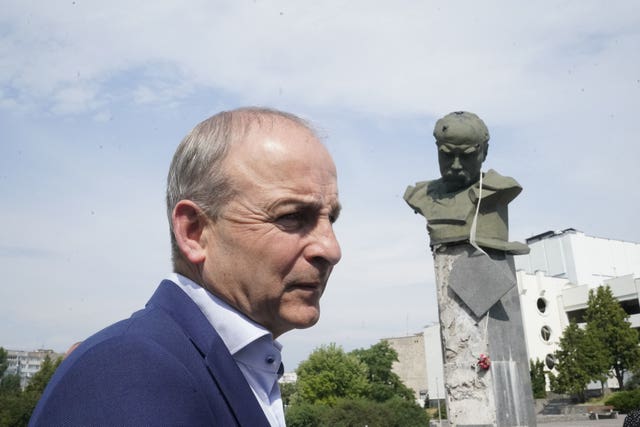
Mr Martin’s trip comes two weeks after President Volodymyr Zelensky invited him to visit Ukraine.
It is the first visit by a Taoiseach to the eastern European country.
It also comes after Mr Putin on Monday declared victory in seizing the eastern Ukrainian province of Luhansk, with his troops escalating their offensive in neighbouring Donetsk.
Mr Martin has warned previously that the Russian president appeared to be leveraging its natural gas supplies to exert maximum pressure on Europe ahead of the winter period.
The Taoiseach has also been a vocal advocate for Ukraine’s fast-tracked membership of the EU.
Mr Zelensky has previously thanked Ireland for its “active support of Ukraine’s European aspirations”.
Ireland has also taken in more than 36,000 Ukrainian refugees since Russia invaded neighbouring Ukraine at the end of February.
The Irish State has given 20 million euro in humanitarian support and assistance to the country, as well as health equipment and medical donations worth more than 4.5 million euro.
In April, fellow cabinet minister Simon Coveney became the first foreign minister of the UN Security Council to visit Kyiv, and met Ukraine’s foreign minister Dmytro Kuleba and defence minister Oleksii Reznikov.


